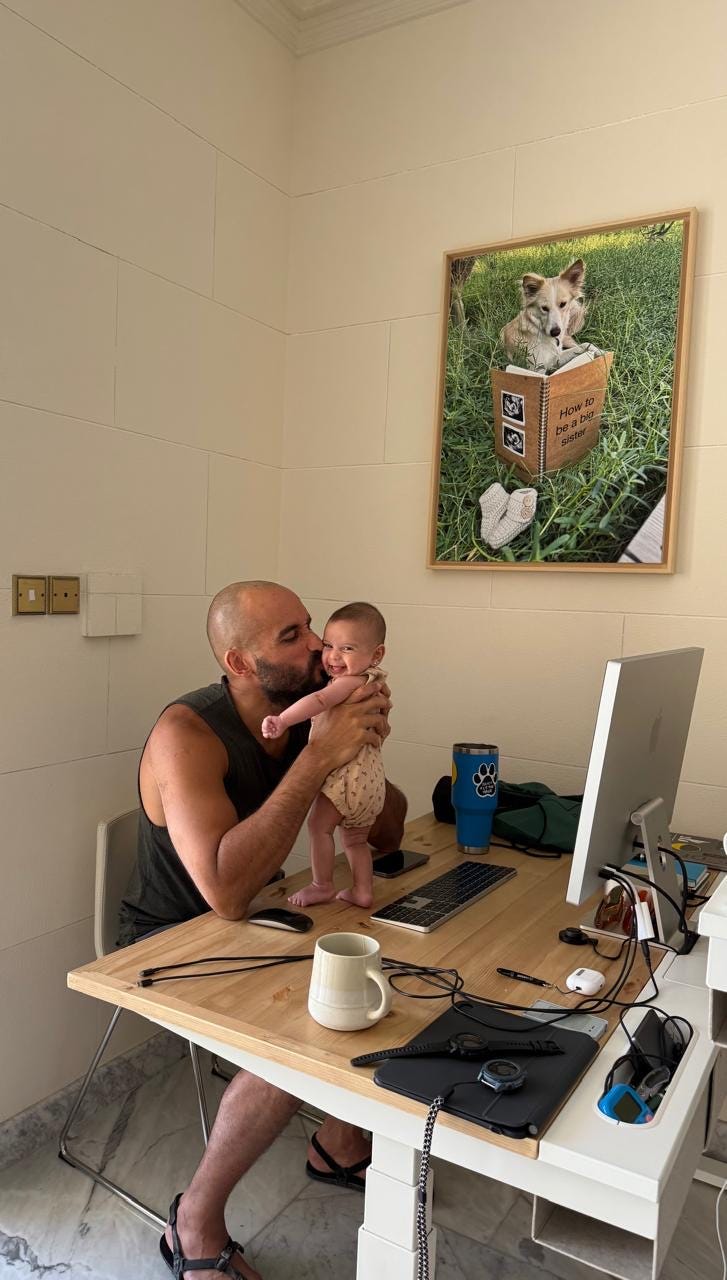Prospective Fathers, Here's My Two Cents
Becoming a dad is wild. Everyone gives you advice—some of it gold, most of it noise. But nothing truly prepares you for how deeply it’ll shift your priorities.
Your world doesn’t shrink; it just refocuses. Suddenly, everything starts with your child. And in my case, with Lora.
I now think more about the long term. About legacy. About meaning. If I’m going to be away from her, it better be for something worthwhile.
It took time to understand my new role in the evolving family dynamic.
Looking back, here’s what I wish someone had told me—not the usual baby books stuff, but the real lessons that hit me along the way.
Focus on your wife’s well being.
It’s easy to think your attention should go straight to the baby. I did too. But you’ll (hopefully) be in awe of how instinctively and powerfully your wife cares for your child. It’s a force you can’t compete with—even on your best day.
The catch? She’ll likely neglect herself in the process. That’s not sustainable.
Think of it like this:
Husband → Wife → Newborn
It’s a chain of care. Keep the base strong.
That doesn’t mean avoiding diaper duty. Often the best way to help your wife is by stepping in directly with the baby. Other times, it’s simpler: remind her to eat, take the night shift so she can sleep, or suggest a nap while the baby rests.
Ease the pressure where you can. Reassure her that while breast milk is ideal, it’s not the only way. Be her emotional safety net.
Your wife will transform into a (beautiful) monster.
Yes, really.
Postpartum hormones are wild. Don’t take anything she says too personally. Her body just went through something unimaginable—and the cost often comes in the form of emotional turbulence and reduced clarity.
It’s not her. It’s the transition. Keep this in mind. Stay kind.
Step up when health concerns arise.
I hope you don’t need this advice, but it might help someone.
Lora struggled to gain weight early on and possibly had a UTI. Eventually, we figured out she had food allergies—which, weirdly, seem to be increasingly common in infants (thankfully, many grow out of them by six months).
Here’s the takeaway: your wife’s instincts will often be spot-on. She’s had a nine-month head start bonding with your child. But her concern might feel overwhelming at times. Minor issues grow into existential threats. As the father, you have a clearer vantage point. Use it. Calm her. Think rationally. Help guide the family forward.
Underpromise. Over-deliver.
My biggest mistake? I did the opposite.
In the heat of the moment, I made promises I couldn’t keep. Don’t do that. Manage expectations—especially your own.
Embrace the ups and the downs.
You’ll be tired. Stressed, Maybe even lost.
You might find yourself in a soggy, smelly poop storm.
But mixed into the chaos are moments so beautiful they’ll leave you speechless. Hang on to those. They’re what this is all about.
I didn’t always follow my own advice well. It’s been a humbling journey, and it’s only getting started.

Prospective grandmothers, the lies I was told:
They told me becoming a grandmother is wonderful, because you can enjoy the baby without the worry.
They told me, “you can give it back to its parents whenever you get tired”.
Well, it turns out you fall deeply, madly, in love all over again, just as you did with your own children.
Turns out, you need a constant reminder that this baby is NOT yours.
Now let’s get to the worry part;
As a mother, you never stop worrying about your children, no matter the age.
So now I worry about my child worrying about his child, (so basically the worry has compounded).
When it comes to giving back the baby,
the truth is, that part sucks; really sucks!
Be prepared to have your heart melt with love and toughen with worry, as you celebrate the all encompassing experience of a new human joining your tribe!
Motherhood changes women in many ways and it’s great that your wife has your support emotionally and physically ✨ Self care and nurturing are vital for women as they navigate the first couple of years of motherhood where they tend to forget themselves!